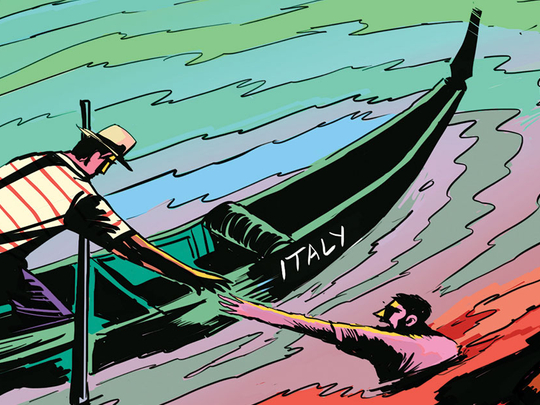
More than 2,000 persons have died in the past few months trying to cross the Mediterranean Sea. A mix of African, Syrian, Kurdish and Iraqi political refugees; men, women and children — all innocent victims of the various gangs who hold sway in this part of North Africa. The government of former Libyan leader Muammar Gaddafi used to restrain such moves. The insane war launched by then French president Nicolas Sarkozy and British Prime Minister David Cameron has turned this longstanding issue into an unbearable drama.
In Europe, reactions depend upon the geographical location: the farther north and east, the lesser the concern. In Italy and Greece, it has become a national issue. When Brussels bureaucrats calculate how these populations could be divided among the several European Union members, the nearest host centres are stormed by refugees. Greece obviously does not have the means to face the situation. In Italy, it has paved the way for all kinds of populism.
In mid-August, Italian Bishop Nunzio Galantino had particularly strong words for politicians “who make up their programmes [based] on the refugees’ skin [colour] whilst doing too little to help them”. These words came after Pope Francis pointed out that “not helping refugees was similar to committing a crime”. The whole Italian political class was shocked by the admonition, with the far-right Lega enjoining the Church “not to meddle in politics”. Yet the embarrassment of the political class was evident and some analysts started to reflect on how to put an end to this drama.
To start with, it is clear that the fate of countries that stand on the frontlines is of far lesser interest to those who stand behind — another example of the split between ‘Northern’ and ‘Southern’ Europe and also proof that the prevalent policies have failed. Once the refugees are at sea, especially if the makeshift boats sink, it is an internationally recognised obligation that they must be saved. Yet it is clear to all observers that any solution to the migrant crisis must start in Libya. The absence there of an organised state, the presence of all types of terrorists (see the horrible massacres perpetrated by Daesh — the self-proclaimed Islamic State of Iraq and the Levant — in Sirte) does not obviously help. An international military intervention is evoked from time to time but would it be feasible (a figure of 200,000 men on the ground is cited)? Hence, the vigorous diplomatic action led by the Italian government, and a statement issued earlier this month by the French, Spanish, Italian, British and American governments, to give United Nations-mandated Spanish negotiator Bernardino Leon all means to achieve his reconciliatory mission. Beyond the existence of two ‘governments’, one should recall there are 150 tribes in Libya, and 3,000 fighters who have come from abroad. Then, and only then, could a stabilising military force of UN ‘Blue Berets’ have a chance to achieve some results — as it is widely known airstrikes alone never brought peace to any conflict.
Advantages
Italy, despite its limited military forces (around 10,000 available soldiers) may have a special role to play in that matter, given its traditional knowledge of the country. As an editorial in the conservative Corriere Della Sera recently put it, there would be at least three advantages: 1) Such action would definitely curb the departure of refugees. 2) Italy would probably be the first to avail the opportunities from the resumption of oil drilling. 3) It would give Italy a role that it could not play during the Greek crisis, when it could hardly confront Germany.
France and Britain seem not to be in a position to assume such a role after their own misadventure in Libya, whereas it would certainly be rewarding for Europe that a ‘Southern’ state also shows it can be counted on whenever required. Such political ‘rebalancing’ would definitely be positive, even though the Italian political class still has to understand it.
A simple humanitarian action at the European level will only settle immediate issues. Decisive action must be undertaken at the very roots of the problems: in Africa as a whole, for sure; in the Middle East, certainly — but these are long-term matters.
Action should be taken at the departing point, effects of which will also be to put a stop to the growing terror threat in the area.It is time to give Italy the political support it needs to go ahead with the realisation of this plan.
Luc Debieuvre is a French essayist and a lecturer at Iris (Institut de Relations Internationales et Strategiques) and the Faco Law University of Paris.









